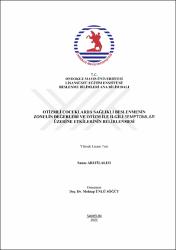Otizmli çocuklarda sağlıklı beslenmenin zonulin değerleri ve otizm ile ilgili semptomlar üzerine etkilerinin belirlenmesi
Künye
Arefilaleh, S. (2021). Otizmli çocuklarda sağlıklı beslenmenin zonulin değerleri ve otizm ile ilgili semptomlar üzerine etkilerinin belirlenmesi. (Yüksek lisans tezi). Ondokuz Mayıs Üniversitesi, Samsun.Özet
Amaç: Bu araştırmada Otizm Spektrum Bozukluğu (OSB) tanısı almış olan bireylerde sağlıklı beslenme tedavisi uygulamasının; bu bireylerde otizm ile ilgili semptomlar, gastroistestinal semptomlar, yaşam kalitesi ve serum zonulin değerleri üzerine etkilerinin belirlenmesi amaçlanmaktadır. Yöntem: Çalışmamız 7-18 yaş arası OSB tanısı alan 15 çocuktan oluşmaktadır. Çalışmaya dahil edilme kriterlerine uyan ve çalışmaya katılmayı kabul eden ailelerin çocuklarının antropometrik ölçümleri alınarak 3 ay boyunca sağlıklı beslenme programı uygulanmıştır. Çalışma süresince çocukların tercih ettiği veya reddettiği besinler ile besin alerjisi durumu göz önüne alınmış olup herhangi bir besinin kısıtlanmadığı ve besin takviyesinin kullanılmadığı beslenme programı önerilmiştir. Çalışma kapsamında değerlendirilen çocukların bağırsak geçirgenliğini zonulin değeri üzerinden değerlendirmek için çalışmanın başlangıç ve bitiminde çocuklardan venöz kan örneği alınmıştır. Serum örneklerinde zonulin değerlerini belirlemek için Zonulin ELISA Kiti kullanılmıştır. Otizm derecelendirmesi için Gilliam Otizm Derecelendirme Ölçeği (GOBDÖ-2-TV) formu, Gastrointestinal Sistem Semptom Şiddet İndeksi (GSİ) formu ve Otizmde Yaşam Kalitesi (OYK) (-Ebeveyn Sürümü formunun Bölüm B kısmı) ölçeği çalışmanın başlangıç ve bitiminde ebeveynler tarafından doldurulmuştur. Bulgular: Çalışmanın başlangıcında ve 3 aylık sağlıklı beslenme programı sonrasında elde edilen sonuçlar değerlendirildiğinde; GOBDÖ TV-2 puanlarında belirlenen azalma istatistiksel olarak anlamlı bulunmuştur (p<0.05). OYK ölçeğinden elde edilen puanlarında belirlenen artışın anlamlı olmadığı bulunmuştur (p>0.05). GSİ puanlarında saptanan azalma istatistiksel olarak anlamlı bulunmuştur (p<0.05). Serum zonulin değerlerinde ise başlangıç değerlerine göre belirlenen azalma istatistiksel olarak anlamlı bulunmuştur (p<0.05). Sonuç: Çalışma kapsamında değerlendirilen OSB'li çocuklarda uygulanan sağlıklı beslenme programı sonrasında otizm semptomları ve GİS bozukluklarında, zonulin değerleri ile ilişkili olarak oluşan değişikliklerin olumlu yönde geliştiği sonucunavarılmıştır. Purpose: In this study, it is aimed to determine the effects of healthy nutrition therapy on autism-related symptoms, gastrointestinal symptoms, quality of life and serum zonulin values in individuals with autism spectrum disorder (ASD). Method: Our study consists of 15 children between the ages of 7 and 18 who were diagnosed with ASD. The height and weight measurements of the children of the families who met the inclusion criteria and agreed to participate in the study were taken and a healthy diet program was applied for 3 months. During the study, the foods preferred or rejected by the children and the food allergy status were taken into consideration, and a nutritional program in which no food was restricted and nutritional supplements were not used was recommended. Venous blood samples were taken from the children at the beginning and end of the study in order to evaluate the intestinal permeability of the children evaluated within the scope of the study, based on the zonulin value. Zonulin ELISA Kit was used to determine zonulin values in serum samples. The Gilliam Autism Rating Scale (GOBDÖ-2-TV) form, Gastrointestinal Symptom Severity Index (GSI) form, and Autism Quality of Life (OYK) (Part B part of the Parent Edition form) scale were completed by the parents at the beginning and end of the study for autism rating. Results: When the results obtained at the beginning of the study and after the 3-month healthy nutrition program were evaluated; The decrease in GOBDÖ TV-2 scores was found to be statistically significant (p<0.05). It was found that the increase in the scores obtained from the OYK scale was not significant (p>0.05). The decrease in GSI scores was found to be statistically significant (p<0.05). The decrease in serum zonulin values determined according to the initial values was found to be statistically significant (p<005). Conclusion: It was concluded that after the healthy nutrition program applied in children with ASD evaluated within the scope of the study, changes in autism symptoms and GIS disorders related to zonulin values developed positively.
















